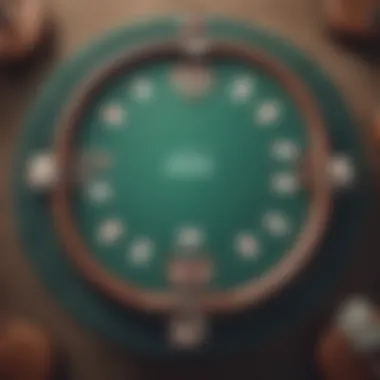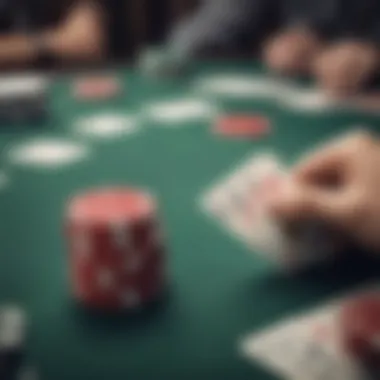A Deep Dive into Tri Card Poker Strategies and Rules


Intro
Tri Card Poker emerged as a popular variant of traditional poker, known for its simplicity and engaging mechanics. It presents a unique blend of the excitement characteristic of poker with easier gameplay suitable for both novices and veterans alike. In this comprehensive exploration, we’ll peel back the layers surrounding this intriguing game to reveal the various elements that contribute to its allure. Understanding the significance of the payout structures, the house edge, and the variety of betting options is essential for anyone hoping to carve a successful path in Tri Card Poker.
Additionally, we will delve into various strategies that can elevate gameplay, as well as the importance of responsible gambling practices. With this foundational understanding, players can significantly enhance their experience at the table.
Prolusion to Tri Card Poker
Tri Card Poker has gained a significant foothold in the gambling world, merging traditional elements of poker with intriguing new twists. This section sets the stage for understanding the importance of Tri Card Poker in both the gaming industry and among casual players. By examining what defines this game and how it has evolved, we arm readers with the foundational knowledge they need to appreciate more complicated strategies and mechanics that follow.
Importance of Tri Card Poker
For those venturing into the world of card games, Tri Card Poker presents an inviting option. This game isn’t just about luck; it demands an understanding of strategy intertwined with the thrill of competition. Players get to engage in a fun yet strategic gameplay experience, where every decision counts. It's a bridge that connects novices with seasoned gamblers, balancing learning and enjoying the game simultaneously.
The format of Tri Card Poker is such that it can be played both online and at physical casinos. This accessibility enhances its popularity, inviting a broader audience to partake. It caters to different preferences—whether a player enjoys the convenience of online platforms or the lively atmosphere of a casino.
What is Tri Card Poker?
At its core, Tri Card Poker is essentially a simplified variant of traditional poker, typically played against the dealer. Each player receives three cards, aiming to form the best possible hand against the dealer's hand. Unlike various poker games requiring bluffing and intricate strategies, Tri Card Poker focuses more on straightforward hand rankings. The objective here is clear: make the best hand, whether it's with high cards, a pair, or even a flush.
The game garners interest due to its quick pace, allowing rounds to unfold swiftly. Players might favor it for a mental break from more complex poker variants like Texas Hold'em or Omaha, reveling in its simplicity amidst an otherwise intricate gambling landscape.
Historical Context and Evolution
Delving into the past brings a rich tapestry of how Tri Card Poker emerged. Its origins are often traced back to traditional poker games, evolving significantly in the late 20th century. The landscape of gambling underwent drastic changes, leading to the introduction of various innovative card games.
Tri Card Poker gained traction in the early 2000s, particularly within casino environments. It became a fan favorite, presenting a distinct combination of traditional rules with a friendly, engaging vibe. Various adaptations of the game have surfaced over time, introducing side bets and variations that have further enriched the gameplay.
Understanding the historical context can amplify one's appreciation for Tri Card Poker as not merely another house game but a product of ongoing evolution and adaptation in the gambling arts. The integration of technology also played a notable role in its progression, particularly with the rise of online gaming.
Tri Card Poker's journey from traditional roots to modern-day platforms highlights how social interaction and technological advancements shape our recreational preferences. As we consider the unique attractions of the game, it can be seen as an intersection of the past and future, maintaining its place in the hearts of enthusiasts.
Basic Rules of Tri Card Poker
Understanding the basic rules of Tri Card Poker is crucial for both newcomers and seasoned players. This foundation sets the stage for a fruitful gaming experience, helping players recognize winning opportunities and risk factors. Grasping how the game operates is fundamental in determining strategies and making informed decisions during play.
Setup of the Game
Setting up a game of Tri Card Poker is simpler than pie. It involves a standard poker table, a dealer, and anywhere from one to seven players. Each player begins by placing their bets – generally known as the ante. Players get three cards each from a single deck, while the dealer also receives three cards, albeit one card facedown. This setup emphasizes the game’s reliance on quick thinking and strategy rather than the complex hand combinations of traditional poker games.
In a Tri Card Poker game, atmosphere is essential. Whether in a bustling casino or a virtual setup, the feel of the game helps set the tone. Players should ensure they understand the betting structure before diving in. Without this knowledge, one might find themselves in murky waters, confused about the rules and winning hands.
Hand Rankings Explained
Unlike traditional poker games where nuances in hand rankings might trip players up, Tri Card Poker simplifies this. Understanding the hand rankings is akin to knowing your ABCs in this game. The hands rank from highest to lowest as follows:
- Straight Flush: Three consecutive cards of the same suit.
- Three of a Kind: Three cards of the same rank.
- Straight: Three consecutive cards of mixed suits.
- Flush: Three cards of the same suit regardless of sequence.
- Pair: Two cards of the same rank plus one unmatched card.
- High Card: If no players have a better hand, the highest card wins.
It's essential to note that while many players may find success with three of a kind, a straight flush significantly ups a player’s chance of winning against the dealer. Understanding these rankings drives home the point that strategy in Tri Card Poker is more about calculated risk than mere luck. Misjudging hand strength can lead to unnecessary losses.
Player Versus Dealer Mechanics
At the heart of Tri Card Poker is the unique player versus dealer mechanic. Should the player have a stronger hand than the dealer, they win the ante and any additional bets on the table. This level of engagement demands not only skill but also an understanding of probabilities and strategic thinking.
Once hands are revealed, the dealer must achieve a minimum qualifying hand, which usually is a queen-high or better, before they can compete. If the dealer fails to qualify, players may win even their ante bets back, without needing a higher hand. It's this mechanic that adds a layer of excitement—players need to assess their odds against the dealer's known required hand. Players often find themselves in a nail-biting scenario, weighing their next moves based on odds, emotions, and calculated guesses. This element is where experience can come into play, making a difference in the outcome of the game.


Remember, the excitement of the game isn’t just about what you hold; it’s about the anticipation of how the dealer will play out their hand.
Understanding the basic rules, knowing how to assess your hand, and the dynamics of play against the dealer are vital in maximizing your Tri Card Poker experience.
Understanding the Betting Structure
Understanding the betting structure in Tri Card Poker is fundamental to getting a grip on the game itself. Betting isn’t just about trying to win chips; it’s about leveraging your knowledge to make informed decisions. It shapes the gameplay experience and impacts your potential payouts. By grasping the various types of bets available, you’ll find yourself not only making educated moves but also having a better grasp of how to minimize losses while maximizing chances of a win.
Types of Bets in Tri Card Poker
In Tri Card Poker, you encounter multiple betting options, each with its own set of rules and implications. Here are the primary ones:
- Ante Bet: This is the initial wager that players must make to participate in the game. It’s pivotal for entry, as it triggers the deal of the cards. Non-payment of this bet means you're not in the game.
- Pair Plus Bet: This optional side bet gives you the chance to win based solely on the value of your hand, irrespective of the dealer’s action. It’s appealing for those looking to savor the thrill of potentially higher payouts.
- Bonus Bets: Some tables may offer various types of bonus bets, usually tied to the strength of a hand. These are riskier but provide greater rewards if successful.
Understanding these bets can help in devising your long-term strategy and adapting your approach depending on how the game unfolds.
Ante and Pair Plus Bets
Let’s dive deeper into the ante and Pair Plus bets. The ante bet in Tri Card Poker acts as the foundation of the game; it signifies your commitment. Failing to make this bet means you can't participate. It’s straightforward but crucial.
On the other hand, the Pair Plus bet plays a different game altogether. It's an optional bet that can lead to bigger winnings based purely on the strength of your three cards. Should you get a pair or better, you could walk away with a reward significantly greater than your initial ante. This added dimension allows players who are feeling lucky to increase their potential take without the necessity of beating the dealer. These two bets work in tandem to provide layers of strategy and excitement to the gameplay.
Side Bets and Their Implications
Side bets can take the thrill to another level, however, they come with their own set of risks. Side bets vary from table to table, but generally, they offer payouts based on specific hand outcomes or sequences. This could be anything from achieving a straight to even hitting a flush.
The primary implication here lies in the risk-versus-reward spectrum. While side bets can result in hefty rewards if your hand aligns with the required criteria, they also usually come with higher house edges, meaning they may not always be the best option if you’re focused on long-term gains.
In summary, understanding these various betting structures not only enhances your gaming experience but equips you with the knowledge needed to navigate through the highs and lows of Tri Card Poker. The strategies you build around these bets can define your success, helping you play smarter and with a clearer focus on achieving favorable outcomes.
Tip: Keep track of which bets yield the best results for your style of play. Each player's approach will differ, so find what works best for you and stick to it.
Payout Structures and Odds
Understanding the payout structures and odds in Tri Card Poker is crucial for players looking to bolster their chances of winning. These elements not only dictate how much a player can win but also influence strategies and decision-making processes during the game. Knowing the potential returns for different outcomes can significantly affect a player’s approach to betting and gameplay.
Understanding House Edge
The house edge in Tri Card Poker is a critical aspect to comprehend, as it represents the casino’s statistical advantage over the players. This figure varies based on how well one understands the game and the strategies employed. Generally, the house edge hovers around 3.4% to 4.0%, depending on the particular rules of the table.
The lower the house edge, the better for players. It means they keep more of their winnings in the long run.
To grasp the impact of the house edge, consider this breakdown:
- Skill-based element: Players who leverage optimal strategies can reduce the house edge.
- Betting tendencies: Players' betting habits can sway the effectiveness of the house edge.
- Game variations: Different variants of Tri Card Poker can present distinct house edges, making it worthwhile to analyze each game type.
Familiarizing oneself with the house edge fundamentally changes how players can approach their bets and the overall gameplay. Every choice, from how much to wager to when to fold, translates directly into potential risks and rewards.
Payout Ratios for Various Hands
Payout ratios provide another layer of insight into the potential returns in Tri Card Poker. Knowing the payout ratios for specific hands helps players gauge the risk-reward balance of their bets. The payout ratios typically reflect the rarity of the hand achieved, which in turn affects the kind of bets players might choose to make.
Here are the common payouts for various hands in Tri Card Poker:
- Straight Flush: 5 to 1
- Three of a Kind: 3 to 1
- Straight: 1 to 1
- Pair: Push
Understanding these figures is essential for making informed decisions at the table. For example, knowing that a straight flush offers a substantial payout compared to other hands encourages players to read the game carefully, analyzing not just their own cards but also potential outcomes based on community interactions.


When preparing to play, it's beneficial to keep these ratios in mind because they vary greatly from game to game. Players might find it wise to prioritize tables that offer higher payouts for the hands they're likely to achieve. Adopting a strategic mindset in this regard can enhance the gaming experience and increase potential returns, laying the groundwork for better gameplay decisions.
Strategic Approaches to Tri Card Poker
In the world of Tri Card Poker, having a strategic approach can be the difference between walking away a winner or regretting poor choices at the end of a long night. Just like any other betting game, a well-thought-out plan allows players to stack the odds in their favor, enhancing not only their enjoyment but also their potential for profit. The effectiveness of strategies lies in understanding the game's dynamics, the betting structure, and the psychological facets at play.
Optimal Play Strategies
Optimal play strategies in Tri Card Poker take into account the game's unique rules and hand rankings. Knowing when to play aggressively and when to fold can define the success of your session. Here are some key points to focus on:
- Starting Hands: The hands you choose to play can significantly affect your winning potential. Hands like a Queen high or better should generally be played. Folding lesser hands like a 9 high is usually better.
- Progressive Betting: Consider increasing your bets as you gain confidence in your winning hands. This isn't an invitation to throw caution to the wind but a way to capitalize on streaks. A minor boost to your ante might catch opponents off guard.
- Dealer Cards: Always keep an eye on the dealer’s cards. Understanding how many cards they are likely to reveal can significantly influence your decisions.
"Success isn't just about what you accomplish in your life; it’s about what you inspire others to do. In Tri Card Poker, it’s all about inspiring confidence while outwitting the dealer."
Adapting Your Strategy to the Game
Flexibility is key in any poker game, including Tri Card Poker. As the table dynamics shift, players must adapt their strategies.
- Reading Opponents: Pay attention to fellow players' betting patterns. Are they conservative or trusting lady luck a bit too much? Adjust your responses accordingly. If someone consistently folds, it could be your moment to raise the stakes.
- Table Position: The position you hold at the table can heavily influence your strategy. Sitting late allows more information to flow your way before you have to act. Taking note of how early players bet provides clues you can exploit.
- Changing Trends: The game's environment can change based on player mood and tactics. A lively table may induce players to take daring chances, while a quieter one might lead to a more careful approach.
Psychological Aspects of Betting
Understanding the psychological aspects of betting is as crucial as knowing the rules. Players often fall prey to their emotions, which can lead to misjudgments.
- Tilt Factor: Many poker players experience "tilt"—a state of emotional confusion that occurs after a setback. Maintaining composure and patience can help avert impulsive decisions in high-stress scenarios.
- Bluffing Wisely: Bluffing can be an effective tool when used appropriately. However, it requires understanding both your own tendencies and those of your opponents. Knowing when to present a strong front while having weaker hands is an art form.
- Self-Control: Establish your limits well before shaking the dealer's hand. Being aware of when you're exceeding your comfort zone helps maintain a healthy balance between playing for fun and getting caught up in the thrill of the game.
Employing strategic approaches in Tri Card Poker will not only build a solid foundation for play but also enhance the overall experience at the table. Knowledge, adaptability, and psychological awareness serve as pillars that can elevate any player's game.
The Role of Technology in Tri Card Poker
In today’s fast-paced world, technology has become a game changer in various fields, and gambling is no different. The advent of digital tools and platforms has transformed how players experience Tri Card Poker. This section sheds light on the significant influence technology holds over the game, offering advantages that were unimaginable in traditional setups.
Online Versus Live Play
Both online and live versions of Tri Card Poker bring unique flavors to the table, yet they cater to different player preferences and styles. In online play, players enjoy the convenience of accessing games anytime and anywhere, all from the comfort of their homes.
- Accessibility: Online platforms enable players to join a game at any hour. The only prerequisites are a stable internet connection and a compatible device.
- Variety of Games: Dedicated online casinos often boast a larger selection of variants, increasing opportunities for players to choose their preferred style.
- Game Speed: Online gameplay usually progresses faster than in-person games. Automatic dealing and fewer distractions can lead to increased hands per hour.
On the other hand, live setups offer an immersive experience that online play may lack:
- Social Interaction: Nothing beats the atmosphere of a bustling casino. Players can read opponents, engage in banter, and share in the collective suspense of the game.
- Tactile Engagement: For many, the act of holding cards and physically participating in gaming rituals adds a layer of satisfaction that digital formats can't replicate.
Is there a clear winner? Depends on what you value; some might even play both ways depending on their mood.
Using Software for Game Analysis
As players seek to increase their edge in Tri Card Poker, software tools have emerged as essential companions. These tools serve multiple functions that enhance decision-making and strategy refinement.
- Statistical Analysis: Software can crunch numbers faster than any player, presenting insights about winning probabilities based on specific hands. Understanding these probabilities can drastically change a player's approach to betting and playing hands.
- Gameplay Feedback: Many software solutions provide real-time feedback, helping players identify tendencies in their game. It's a method of self-improvement that's both effective and efficient.
- Simulations and Scenarios: Some platforms allow users to simulate various scenarios to practice new strategies without the risk of losing money. Players can test different approaches to various hands and betting situations.
"Utilizing technology in poker offers a strategic upper hand, but it’s essential to understand the tools and use them wisely without becoming overly reliant."
In closing, as gambling continues to embrace digital advancements, understanding the role of technology in Tri Card Poker becomes crucial. Whether through the convenience of online platforms or through innovative analytical tools, players have more resources than ever to sharpen their skills and enhance their gameplay.
Common Mistakes to Avoid


When engaging in Tri Card Poker, understanding common pitfalls is crucial for anyone looking to enhance their gameplay. These mistakes can deeply affect not only one’s enjoyment but also their success at the table. By acknowledging and avoiding these errors, players can significantly improve their chances and develop a more strategic approach to the game.
Misjudging Hand Strength
One of the most common missteps players make in Tri Card Poker is misjudging hand strength. In a game where players have just three cards, the potential combinations and their corresponding strengths differ from traditional poker games. For instance, many players feel confident with a pair when they might be better served by folding.
In a classic game of poker, a pair can often be a winning hand; however, the dynamics in Tri Card Poker are unique. A flush or a straight can lead to stronger outcomes that players might not immediately appreciate. This is especially true when a player holds a high card strength but fails to recognize the potential of other hands on the table. Being overly reliant on the typical strength of poker hands without considering the specific context of Tri Card Poker can lead to unnecessary losses.
To mitigate this mistake, players must familiarize themselves with the hand rankings unique to this game and internalize them. Studies and practice hands can be helpful tools here. Always keep in mind – while a pair might feel solid, it can quickly get overshadowed by hands of greater strength.
Ignoring Statistical Probabilities
Another misjudgment that is often seen at the tables is ignoring statistical probabilities. Each decision in Tri Card Poker should ideally be influenced by a solid understanding of odds and likely outcomes. Many players dive into hands without assessing their chances versus the potential for their opponents. Ignoring how likely it is to win with a certain hand can lead to poor betting decisions.
For example, consider the odds of drawing certain hands or how likely an opponent is to also have a strong hand. Failing to factor in the house edge or the chances of hitting specific combinations can be detrimental.
"Understanding the math behind your decisions is just as vital as the cards in your hand. It’s not just about playing the game; it’s about playing the odds."
To combat this, it’s advisable to spend time learning about the statistical aspects of the game. Useful resources include strategy guides and probability calculators. By gaining a better grasp on these odds, players will find that their decision-making improves, enabling wiser bets and cuts down on losses.
In summary, by avoiding the mistakes of misjudging hand strength and ignoring statistical probabilities, players can elevate their Tri Card Poker experience. The learning curve may be steep, but with awareness and practice, success can be much more attainable.
Responsible Gambling Practices
The essence of responsible gambling practices cannot be overstated. In a game like Tri Card Poker, where the thrill of chance meets strategic decision-making, it’s all too easy for players to get swept up in the excitement. Understanding how to engage with the game responsibly is crucial for enjoying it without falling prey to negative consequences.
Understanding Limits
Setting limits is a fundamental aspect of gambling responsibly. Whether it’s determining how much money one is willing to place on the table or deciding a time limit for gameplay, having clear boundaries helps maintain control.
- Financial Limits: Players should establish a budget before engaging in any gambling activity. Once that budget is spent, it’s important to walk away. Not just a suggestion, setting caps on deposits or losses can safeguard against impulsive behaviors. Consider using tracking methods to monitor expenditures.
- Time Management: Limiting the amount of time spent playing ensures that gambling does not interfere with other important aspects of life, like work or personal relationships. A good practice is setting a timer to remind oneself to take breaks. This tactic can contribute not just to longevity in gameplay but also to mental clarity.
By adhering to strict limits, players can ensure that their gambling remains a source of enjoyment rather than a source of stress or financial strain.
Recognizing Problem Gambling Signs
Awareness of problem gambling signs is key to fostering a safe environment for players and their loved ones. It often starts subtly, with behavioral cues that may go unnoticed. Here are some typical indicators that it might be time to reassess one's gambling habits:
- Emotional Responses: If gambling brings about feelings of anxiety, withdrawal, or irritability when you’re not playing, it can signal a concerning relationship with the game.
- Chasing Losses: A common trap is attempting to recover lost funds quickly, often leading to more significant losses instead. Recognizing this can prevent a cycle of desperation.
- Neglecting Responsibilities: When gambling begins to interfere with daily responsibilities—at work, in relationships, or with family obligations—it’s essential to reflect on priorities.
"Gambling should be a form of entertainment, not a route to despair. Recognizing the signs early can be the difference between enjoyment and adversity."
Recognizing these flags doesn’t just apply to oneself; friends and family should also be attentive. Encouraging open conversations about gambling behaviors can foster awareness and responsibility within social circles.
End
The conclusion of this article on Tri Card Poker ties together the many threads of understanding and insight that have been explored throughout. Tri Card Poker isn’t just another card game; rather, it’s a dynamic blend of strategy, chance, and player psychology. By focusing on the key aspects of the game—such as rules, betting structures, and strategic approaches—players can enhance their overall experience and potentially increase their chances of success.
Key Takeaways
- Game Mechanics: The foundational rules and hand rankings of Tri Card Poker are essential for any player seeking to grasp the game fully. Knowing how the game operates sets the stage for effective engagement and decision-making.
- Betting Strategies: Understanding the various types of bets available allows players to approach the game with informed risk. Knowing when to play conservatively or to venture bold, high-stakes bets can significantly impact the outcome.
- Psychological Elements: As with many forms of poker, the psychological aspect is paramount. Reading opponents and managing one’s own emotional state can lead to more successful gameplay.
- Responsible Gambling: No matter how skilled a player becomes, maintaining awareness of personal limits and recognizing the signs of problem gambling can prevent negative consequences both financially and personally.
"The essence of gambling is not just in winning but in understanding yourself and the game."
By reflecting on these points, players can approach Tri Card Poker with a more strategic mindset, increasing both enjoyment and the potential for success.
Future Trends in Tri Card Poker
The future of Tri Card Poker appears promising, influenced by rapidly evolving technology and changing player demographics. Here are some potential trends that could shape the game:
- Integration of Online Platforms: The increasing popularity of online casinos means that Tri Card Poker will be more accessible than ever. Players from various parts of the globe can compete against one another, creating a melting pot of strategies and styles.
- Augmented Reality Gaming: With advances in AR, it’s possible that the traditional table setup could be revolutionized. Imagine playing with friends across the globe while appearing to share the same physical space through virtual tables.
- Player Analytics Tools: As technology advances, software for analyzing game performance will likely become more sophisticated. Players may have access to stats that offer insights into their gameplay, helping them refine their strategies more effectively.
- Focus on Responsible Gambling: As awareness about gambling addiction grows, future editions of Tri Card Poker may incorporate features aimed at promoting responsible gambling, such as built-in alerts that remind players of their betting limits.
In sum, understanding the nuances of Tri Card Poker not only enhances your gameplay but also equips players with the knowledge needed to navigate a changing gambling landscape. Whether you’re experienced or just dipping your toes in, there’s always something new to learn.















